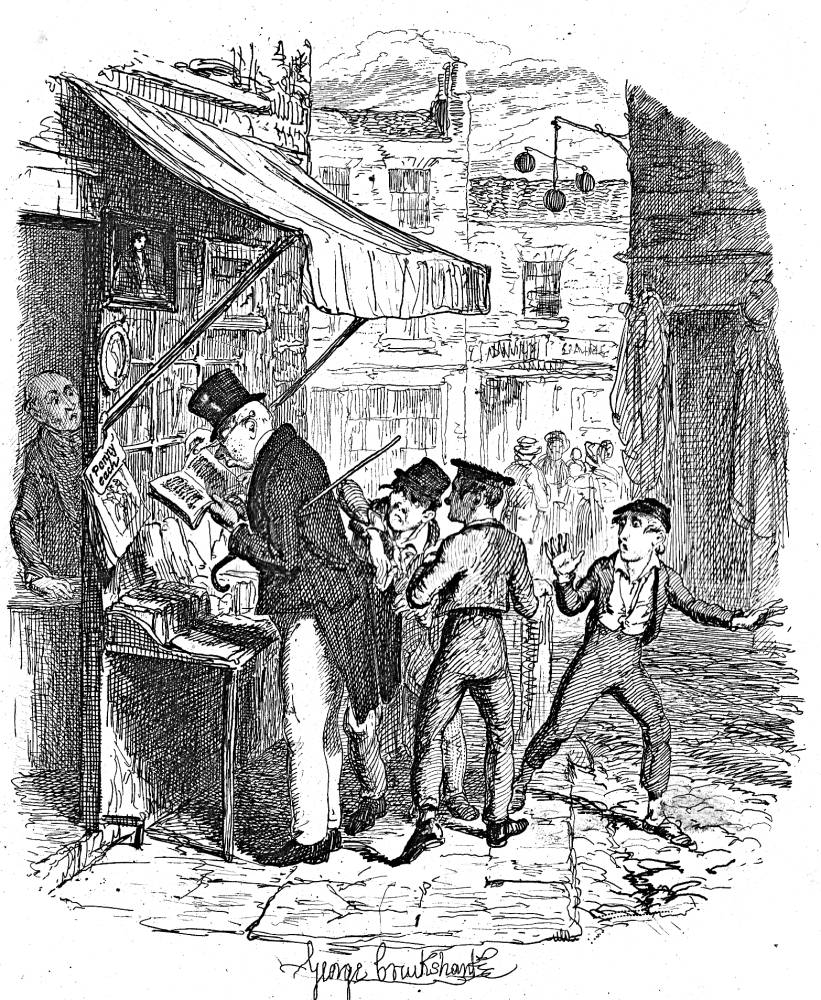Education and Morality

This section will examine representations of education and morality in Oliver Twist and A Christmas Carol, and some of Dickens's key speeches.
Dickens fundamentally believed in the importance of an education to give children the best start possible to life. In a speech at the Opening of the Free Library in Manchester (1852), he calls himself:
a zealous advocate for the diffusion of knowledge among all classes and conditions of men.
The New York Public Library. 1850-1959. Wellington House Academy, Hampstead Road, London.
As we have previously seen, Dickens worked tirelessly to achieve this aim. He exhorted his readership to support Ragged Schools; opened the first teacher training college in 1840; and addressed the issues time and time again in his novels.
His whole attitude may best be summarised in a speech he gave at the Polytechnic Institute of Birmingham in 1844:
If you would reward honesty, if you would give encouragement to good, if you would stimulate the idle, eradicate evil, or correct what is bad, education -- comprehensive liberal education -- is the one thing needful, and the one effective end.
This problem of ignorance is explored in A Christmas Carol in several ways. Most notably in Stave Four, Dickens uses the metaphors of 'Ignorance and Want' to examine the poor education that children were receiving in the Victorian ‘Ragged Schools’, and also the effect that this had on their ability to achieve a good material life.
The Ghost of Christmas Present introduces these characters, two small children, from under his robe:
Yellow, meagre, ragged, scowling, wolfish...Where graceful youth should have filled their features out, and touched them with its freshest tints, a stale and shrivelled hand, like that of age, had pinched, and twisted them, and pulled them into shreds. Where angels might have sat enthroned, devils lurked, and glared out menacing. No change, no degradation, no perversion of humanity, in any grade, through all the mysteries of wonderful creation, has monsters half so horrible and dread.

“This boy is Ignorance. This girl is Want. Beware them both, and all of their degree, but most of all beware this boy, for on his brow I see that written which is Doom, unless the writing be erased"...cried the Spirit, stretching out its hand towards the city.
Here, Dickens highlights the exceeding danger of ignorance, caused by a lack of proper education, and the subsequent “Doom” it can cause. In fact, the arc of the whole novel is emblematic of the importance of education, as Scrooge is re-educated to appreciate the merits of life and comes to enjoy them.
The novel also shows how a good education can create a higher moral standard in society, improving the lives of everyone, as Scrooge goes on to give to charitable causes, and assist Bob Cratchitt and his son Tiny Tim.
Later on, in Stave Five, after Scrooge has been released from travelling with the Ghosts, he exclaims:
I am as light as a feather, I am as happy as an angel, I am as merry as a schoolboy. I am as giddy as a drunken man. A merry Christmas to everybody!
Dickens uses the analogy of a schoolboy to denote merriment and joy. This expresses both his belief that education creates happier, kinder people, and that it should be experienced by everyone, not just the few.
In Oliver Twist, it is under the poisonous influence of Mr. Bumble where the result of a lack of education is established, and the views of the upper classes are clearly displayed. Noah Claypole, from the Sowerberry's house, clearly feels superior to Oliver for his being a ‘charity boy’ – referring to the lower-class schools organised by the churches. Resorting to violence, Oliver is soon kicked out of the house, which only confirms their views that a bad education breeds violence.

When he arrives in London, Oliver is soon taught the dark art of pickpocketing by the duplicitous Fagin. This is from Chapter 9:
Thinking that the Jew, being so much his senior, must know best, he followed him quietly to the table, and was soon deeply involved in his new study.
Here, the dangers of a false and corrupted education is explored. Whilst Oliver's new education may be achieving an objective - to learn how steal money and possessions - Dickens is highlighting the immorality of this form of education. By contrasting Oliver's character with the other people he meets in the dark streets of London - most notably the horrible Bill Sykes - Dickens shows just how corrupt people can become when they aren't given an opportunity for good moral education.
At the very end of the novel, when Oliver finally arrives at Mr. Brownlow's residence to be educated and given a new life, we briefly see him achieving a good education. This is from Chapter 53:
How Mr. Brownlow went on, from day to day, filling the mind of his adopted child with stores of knowledge, and becoming attached to him, more and more, as his nature developed itself, and showed the thriving seeds of all he wished him to become.
Here, there is an emphasis not only on intellect but also on morality. For Dickens, the two come hand-in-hand. He believed that the effects of a good education are profound and long-lasting, and that morality would triumph. In a speech given at the Manchester Athenaeum in October 1843, he said:
in my heart, I am quite certain that long after this institution, and others of the same nature, have crumbled into dust, the noble harvest of the seed sown in them will shine out brightly in the wisdom, the mercy, and the forbearance of another race.
It is these seeds which Dickens deems to be of great importance; for him education is the ultimate example of such an act ensuring the integrity of future generations.
